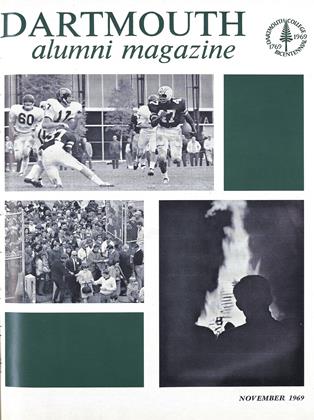ALL THE BEST IN THE CARIBBEAN, INCLUDING PUERTO RICO AND THE VIRGIN ISLANDS.
NOVEMBER 1969 JOHN HURD '21ALL THE BEST IN THE CARIBBEAN, INCLUDING PUERTO RICO AND THE VIRGIN ISLANDS. JOHN HURD '21 NOVEMBER 1969
By SydneyClark '12. New York: Dodd, Mead &Company, 1969.461 pp.With maps andillustrations. $6.95.
Based on several visits totaling months of research on almost every island big and little, including Surinam, this volume, unlike earlier editions, concentrates on the true Caribbean. Owing to political upheavals, travel currents have changed radically in the past half-dozen years. Cuba is out. In are Puerto Rico, expecting a million tourists a year, and the Virgin Islands - 300 cruises each season with St. Thomas the number one cruise in the Caribbean. Even midsummer Caribbean vacations win favor among North Americans who realize that Caribbean summers are sunnier and, in many seaside areas, cooler than in the States. Jamaica is becoming increasingly popular, and even the Dominican Republic, which in 1961 began to awake from the Trujillo delirium tremens, and Haiti, impoverished and prostrated, are beginning to attract tourists.
Mr. Clark has omitted Bermuda and the Bahamas, covered in a separate "All the Best" book, but Puerto Rico and the Virgins are included in both volumes. Cuba is completely deleted. Of the three Guineas, only the Dutch, now called Surinam, interests American travelers, and it is given 28 pages.
The tremendous variety of the Caribbean is appropriately emphasized. The dozens and scores of islands are as variegated as the scenery and the natives with skins a spectrum from pale to jet black and with eyes all the way from round Teutonic to Oriental slits vanishing completely in laughtenatives who speak four languages and many dialects.
In print and in illustrations you will be informed how honeymoon couples sip milk from one coconut, a dancer wriggles under a limbo bar one foot above the floor, Grenada produces one third of all the world's nutmegs, bush Negro men in Paramaribo wearing only loin cloths and Negro women only a small apron meet planes, one goes rafting on the Rio Grande, Jamaicans climb coco palms with squirrel-like ease, and nonnatives behave in night clubs bohemian and deluxe.
Such are the romantic attractions. Vitally important are Mr. Clark's complementary and judicious remarks about languages and allegiances, easy-to-use maps, passports and vaccination certificates, clothes and luggage, money and tipping, free-port shops and customs, food and drink, weather and illness, airmail and gasoline.
 View Full Issue
View Full Issue
More From This Issue
-
 Feature
FeatureBlack Studies: A Beginning
November 1969 By SUSAN LIDDICOAT -
 Feature
FeatureThe Most Dangerous Gap of All
November 1969 By THOMAS J. McINTYRE '37 -
 Feature
FeatureThe Dean Charts a Course
November 1969 -
 Feature
FeatureA Conclave of Noted Scientists
November 1969 -
 Feature
FeatureCOED EXCHANGE
November 1969 -
 Article
ArticleWith the Big Green Teams
November 1969
JOHN HURD '21
-
 Article
ArticleTHE COLLEGE
January 1952 By JOHN HURD '21 -
 Article
ArticleAround the World in Fifty Books
March 1952 By JOHN HURD '21 -
 Article
ArticleTHE NEW FRONTIER
February 1953 By JOHN HURD '21 -
 Books
BooksAMAZING BUT TRUE ANIMALS.
JANUARY 1964 By JOHN HURD '21 -
 Article
ArticleThis Mother of Seven Dartmouth Sons Read Every Book in the College Library
DECEMBER 1965 By JOHN HURD '21 -
 Books
BooksP AS IN POLICE.
JANUARY 1971 By JOHN HURD '21
Books
-
 Books
BooksALUMNI PUBLICATIONS
May 1920 -
 Books
BooksWOMEN, WOMEN, EVERYWHERE.
MAY 1964 By ADDISON L. WINSHIP II '42 -
 Books
BooksTHE BIG E: The Story of the USS Enterprise
MARCH 1963 By ALBERT L. DEMAREE -
 Books
BooksADVENTURES IN BIOGRAPHY.
November 1956 By DONALD BARTLETT '24 -
 Books
BooksYOU COME TOO: FAVORITE POEMS FOR YOUNG READERS.
December 1959 By STEARNS MORSE -
 Books
BooksREFLECTIONS ON THINGS AT HAND, THE NEO-CONFUCIAN ANTHOLOGY, COMPILED BY CHU HSI & LÜ-CHTEN.
NOVEMBER 1967 By T.S.K. SCOTT-CRAIG

